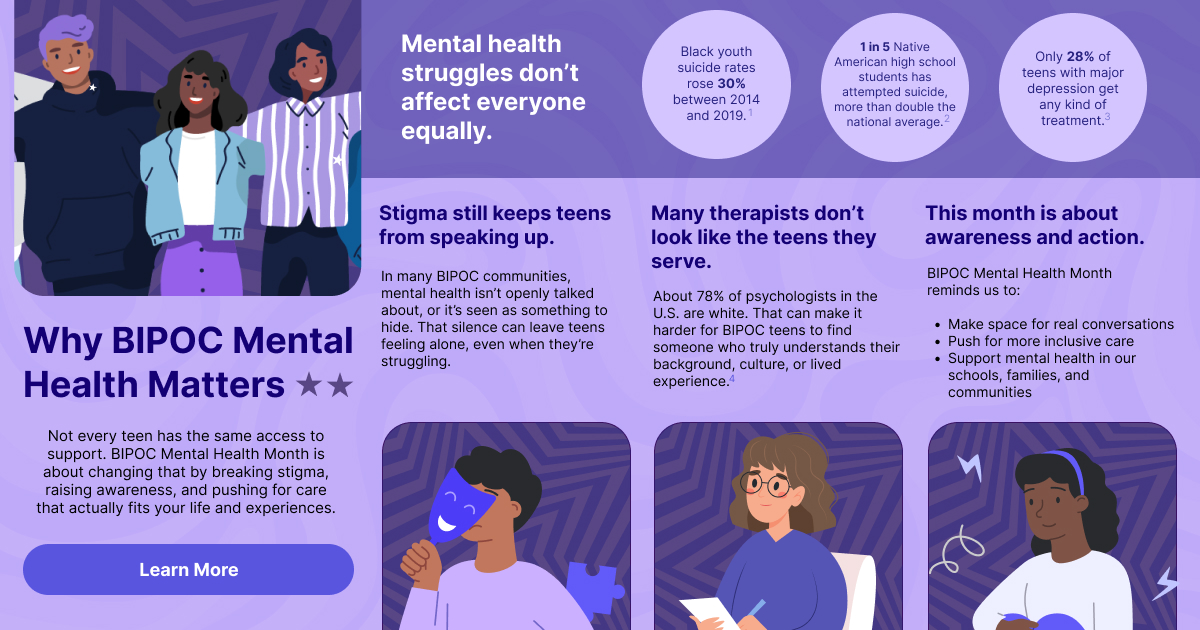National Grief Awareness Day: Understanding the Types of Grief
August 30 is National Grief Awareness Day, a chance to bring more understanding to a topic that often gets brushed aside. For teens, especially, the different types of grief can be confusing and isolating. They may not have the words to describe what they’re experiencing, feeling like nobody gets it.
Whether you’re struggling with grief yourself or supporting someone else, let’s break down the types of grief, how they affect teens, and what real coping looks like.
Types of Grief
Learning about the different types of grief may help you better understand what you or someone you care about is experiencing. Many types of loss can cause grief. It’s not limited to death, and it doesn’t always look like sadness. Some teens feel nothing. Others feel everything at once. There’s no single way to experience grief, and no one way to talk about it. These are a few forms grief can take.
-
Anticipatory Grief
This type of grief happens when you know something painful is coming. If someone close to you is sick, or if your parents are about to separate, the sadness can start before anything is officially over. You might feel worried, angry, helpless, or exhausted from holding it all in.
Even though the loss hasn’t happened yet, the emotions are real. Some teens try to prepare themselves emotionally. Others feel guilty for having strong feelings early. On National Grief Awareness Day, take a moment to acknowledge what you’re feeling.
-
Disenfranchised Grief
People don’t always understand the losses that affect teens. Maybe you’re grieving a breakup or a friend who moved away. Maybe you’re missing a teacher, mentor, or pet. If others brush it off like it doesn’t matter, it can make you feel like you have to hide your feelings.
-
Delayed Grief
Grief doesn’t always show up right away. You might feel numb or distracted when a loss first happens. Then, later, something random triggers all the emotions at once — possibly weeks or months after the fact.
Delayed grief is common, especially when you’re focused on keeping it together or supporting others. The pain might hit when you finally slow down or feel safe enough to let it out. This is one of the many types of grief teens experience that may not be recognized right away.
-
Collective Grief
Some losses affect whole communities. A tragedy at school, a death that impacts many people, or even ongoing fear about the state of the world, can cause shared sadness. It’s not just your pain, it’s everyone’s.
This type of grief can feel heavy and confusing, especially if you don’t feel like you have a personal reason to be upset. But your reaction is still valid.
-
Complicated Grief
Most people expect grief to fade over time. That doesn’t always happen. If your sadness doesn’t ease after several months, or you feel stuck in place, you may be dealing with complicated grief.
It can show up as hopelessness, withdrawal, or the sense that nothing will ever feel right again. It can also be tied to guilt or anger you don’t know how to express. Therapy can help with this.
-
Identity Grief
Sometimes, grief comes from losing a part of yourself. This type of grief can happen after a big life shift — like leaving a sport, dropping out of a program you loved, coming out and losing a relationship, or realizing you’re no longer the person you used to be.
Losing parts of your identity can hurt, even when the change is something you chose. It’s okay to grieve the past version of yourself while adjusting to the present one.
Symptoms of Grief in Teens
Grief can affect teens emotionally, physically, mentally, and socially. And unlike adults, who may have more tools or life experience, teens often struggle to process what’s happening or feel pressured to “be strong” for others. Recognizing the signs can help you understand what’s normal and when it might be time to get help.
Understanding the symptoms of grief in teens also helps friends, families, and caregivers know how to offer meaningful support.
Emotional and Mental Symptoms of Grief in Teens
- Intense sadness, hopelessness, or emotional numbness
- Anger or irritability, sometimes directed at people who didn’t cause the loss
- Anxiety or fear about the future or other possible losses
- Guilt or regret, especially if the loss involved conflict or sudden change
- Trouble concentrating or remembering things
You may also feel like you’re “going crazy” because your emotions don’t make sense. One minute you’re crying, the next, you’re laughing. That doesn’t mean anything is wrong with you. It’s just how grief moves: back and forth, in unpredictable waves.
Physical and Behavioral Symptoms of Grief in Teens
- Sleeping too much or not sleeping at all
- Headaches, stomachaches, or feeling sick without a clear reason
- Loss of appetite or overeating
- Withdrawing from friends, activities, or school
- Acting out, being reckless, or taking more risks than usual
Your body holds onto all types of grief just like your mind does. If you feel exhausted or physically off, that could be grief talking, even if you didn’t expect it. These symptoms of grief in teens are sometimes missed or misunderstood.
How to Cope with Grief
There’s no way to “fix” grief. But there are ways to move through grief with care, connection, and patience. Here are a few approaches that can help with the symptoms of grief in teens.
-
Talk to Someone Who Listens
Grief doesn’t like silence. Talking to a trusted adult, therapist, or peer can help you feel less alone. You don’t have to explain everything perfectly. Start with: “I’m not okay right now,” or “I don’t know what I need, but I think I need to talk.”
-
Use Creative Expression as an Outlet
Grief doesn’t always make sense in words. That’s why music, art, journaling, poetry, and dance can be powerful ways to release pain. Even scribbling how you feel or making a playlist can help.
-
Build Small Routines for Stability
You don’t have to overhaul your life to cope with different types of grief. Try adding small routines like:
- Getting out of bed and brushing your teeth
- Eating one solid meal a day
- Taking a walk or sitting outside
- Limiting phone time before bed
These small acts of self-care can anchor you when emotions feel like a storm.
-
Accept That Grief Is Messy
You might cry in the middle of class or laugh at a memory and, then feel guilty about it. You might go days feeling okay and then break down out of nowhere. This is all normal.
Most types of grief don’t follow rules. It’s okay if your healing doesn’t look like someone else’s. National Grief Awareness Day is a reminder that grief looks different for everyone — and that includes you.
Ascend Offers Support for Grieving Teens
At Ascend, we know all of the types of grief can turn your world upside down. Whether you’re mourning the death of someone close, the loss of a relationship, or a big life change, you deserve care and support.
Our mental health treatment program offers a safe, affirming space where you can talk about what you’re going through and learn tools to manage your emotions. You don’t have to grieve alone. We’re here to walk with you through it. Call 310.388.3713 to speak with a member of our admissions team today.
FAQ
What are the stages of grief?
The five stages are denial, anger, bargaining, depression, and acceptance. But not everyone experiences them in order or even experiences all five. You might move back and forth between them. Different types of grief result in a unique, personal journey.
Can I recover from grief on National Grief Awareness Day?
Grief isn’t something you recover from. It’s something you learn to live with. Over time, the pain may become less sharp. With support from others, you can start finding joy again, even while remembering what you lost.
Is it normal to feel nothing after someone dies?
Yes. Feeling numb is a common part of different types of grief, especially in the early days. Your brain may be protecting you from overwhelming pain. Emotions often come later, and when they do, it’s okay to let yourself feel them.
When should I seek help for grief?
If grief is keeping you from going to school, functioning in daily life, or feeling any sense of hope, it’s time to talk to someone. Take this National Grief Awareness Day to assess your mental state and decide if you need a little extra support.



